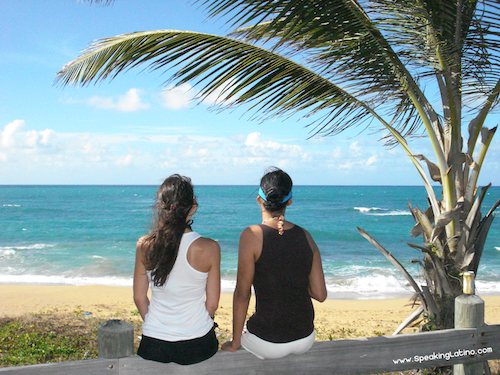I often say this in Puerto Rico, surrounded by Puerto Ricans. Most times I barely finish the sentence when I am attacked, insulted or accused of not-too-nice things. Then I explain why. And even Puerto Ricans chuckle, smile and agree.
My reasoning is based on two simple facts:
1. Puerto Rican words are often just the English word with a local pronunciation. Many colors, car parts, and foods use English words. In my (non-Speaking Latino) business I use the phrase blue-black on a regular basis. Not once in 10 years have I heard a single Puerto Rican say negro azulado. Puerto Ricans ALWAYS say blue-black. Other examples (as mentioned in the following videos) are nice, size, shock, brown, tuna, ticket, relax, income tax and ready. Limpiaparabrisas does not exist in Puerto Rico. Only wiper is used. Tarjeta de embarque….never. Just boarding pass. This means that a student will not learn basic vocabulary while in Puerto Rico.
2. A large portion of Puerto Ricans immediately switch to English if they hear a foreigner speak Spanish. This even happens to me after studying Spanish for over 15 years, and living several years when I spoke almost 100% Spanish. I am just as comfortable now in Spanish as English. This reaction to foreigners may be an interest on the Puerto Rican’s part to practice English or to accommodate the visitor and make them feel more comfortable. Either way, the result is almost no opportunity for the student to practice Spanish outside the classroom.
And now I have video vindication. Produced by, with and to Puerto Ricans, these videos were part of a campaign designed to educate Puerto Ricans that “correct” Spanish should be used in place of the English words used daily. All the people in the videos were public figures at that time. If you are Puerto Rican or understand Puerto Rican Spanish, I promise, these videos will make you laugh. I guarantee it or your money back.
These videos show how ingrained English is into Puerto Rican Spanish. The interesting question is why is this so, and what keeps the English influence from disappearing. The clear answer to how this occurred is the United States influence in Puerto Rico since 1898. With a major military and civil presence in Puerto Rico and open immigration, the mix of languages is a daily part of Puerto Rican life.
Why this continues also may be explained by social pressure. Any Puerto Rican who attempts to speak pure Spanish in an informal conversation, eliminating all English vocabulary will face two obstacles: 1) He will not be understood by others, 2) He will be labeled stuck-up, snobbish or in local terms comemierda.
Now, enjoy a couple laughs from the videos. If you think of other words that should have appeared in the videos, leave a comment.
